
How to use Menopur
PATIENT INFORMATION LEAFLET
Leaflet accompanying the packaging: patient information
MENOPUR, 75 IU FSH + 75 IU LH, powder and solvent for solution for injection
for injection
Menotropin
Read the leaflet carefully before using the medicine, as it contains important information for the patient.
- Keep this leaflet, you may need to read it again.
- In case of any doubts, consult a doctor.
- This medicine has been prescribed specifically for this person. Do not pass it on to others. The medicine may harm another person, even if their symptoms are the same.
- If the patient experiences any side effects, including any not listed in this leaflet, they should tell their doctor. See section 4.
Table of contents of the leaflet:
- 1. What MENOPUR is and what it is used for
- 2. Important information before using MENOPUR
- 3. How to use MENOPUR
- 4. Possible side effects
- 5. How to store MENOPUR
- 6. Package contents and other information
1. What MENOPUR is and what it is used for
MENOPUR is a powder (in this case, a solid, compact mass) that must be dissolved in a liquid (solvent) before use. The medicine is administered as a subcutaneous or intramuscular injection.
MENOPUR (highly purified menotropin obtained from the urine of postmenopausal women) contains two hormones: follicle-stimulating hormone (FSH) and luteinizing hormone (LH).
FSH and LH are hormones produced in the body of a woman and a man. They enable the normal functioning of the reproductive organs.
MENOPUR is used to treat infertility in the following situations:
in women who cannot become pregnant because their ovaries do not produce eggs (also in the case of so-called polycystic ovary syndrome). MENOPUR is used in women who have already been treated with clomiphene citrate for infertility, but the medicine has proven ineffective;
in women participating in assisted reproduction programs, such as in vitro fertilization and embryo transfer, gamete intrafallopian transfer, and intracytoplasmic sperm injection. MENOPUR stimulates the ovaries to produce multiple follicles in which eggs can develop (development of multiple follicles);
in men whose testes produce insufficient sperm due to a deficiency of gonadotropins (hormones produced by the pituitary gland and affecting the testes).
2. Important information before using MENOPUR
Before starting treatment with MENOPUR, the doctor must assess the causes of fertility disorders in both partners. In particular, it should be checked whether the following diseases are present, which require different, appropriate treatment:
hypothyroidism and adrenal insufficiency;
high levels of the hormone prolactin (hyperprolactinemia);
tumors of the pituitary gland (a gland located at the base of the brain);
tumors of the hypothalamus (an area located under the part of the brain called the hill).
If the patient has been diagnosed with any of the above diseases, they should inform their doctor before starting treatment with MENOPUR.
When not to use MENOPUR
In women and men:
if the patient is allergic to menotropin or any of the other ingredients of this medicine (listed in section 6);
if pituitary or hypothalamic tumors have been diagnosed
In women:
if the patient is pregnant or breastfeeding;
if the patient has ovarian cysts or ovarian enlargement not caused by polycystic ovary syndrome;
if the patient has vaginal bleeding of unknown cause;
if the patient has uterine, ovarian, or breast tumors;
if the patient has developmental defects of the genital organs that prevent pregnancy;
if the patient has uterine fibroids that prevent pregnancy;
if the patient has entered early menopause.
In men:
if the patient has prostate cancer;
if the patient has testicular tumors.
Warnings and precautions
Caution should be exercised if the patient experiences:
abdominal pain;
abdominal distension;
nausea;
vomiting;
diarrhea;
weight gain;
breathing difficulties;
decreased urine frequency or amount.
The above symptoms should be reported to the doctor immediately, even if they occur several days after the last dose of the medicine. They may be symptoms of excessive ovarian activity, which can be severe.
If these symptoms worsen, fertility treatment should be discontinued and appropriate hospital treatment should be initiated.
Following the recommended dose and carefully monitoring the treatment reduces the likelihood of these symptoms.
These symptoms may also occur when MENOPUR is discontinued. If any of these symptoms occur, the doctor should be contacted immediately.
During treatment with MENOPUR, the doctor usually refers the patient for ultrasound examinations (using ultrasound) and sometimes for blood tests to check the response to treatment.
Treatment with hormones such as MENOPUR may increase the risk of:
ectopic pregnancy (outside the uterus) in women with previously diagnosed fallopian tube diseases;
miscarriage;
multiple pregnancy (twins, triplets, etc.);
congenital defects (physical defects present in the child at birth).
In some women treated for infertility, ovarian or other reproductive organ tumors have developed. It is not yet known whether this was caused by hormone treatment such as MENOPUR.
The risk of blood clots in veins or arteries is higher in pregnant women. Fertility treatment may increase the risk of blood clots, especially if the patient is overweight or has had blood clots before or has a family history of blood clots (relatives). The patient should inform their doctor if they think this applies to them.
MENOPUR, in combination with a hormone called human chorionic gonadotropin (hCG), may be administered in the treatment of infertility in men.
Children and adolescents
The use of MENOPUR in children and adolescents is not appropriate.
MENOPUR and other medicines
Tell your doctor about all medicines you are currently taking or have recently taken, as well as any medicines you plan to take.
Clomiphene citrate is another medicine used to treat infertility. If MENOPUR is administered at the same time as clomiphene citrate, the effect on the ovaries may be enhanced.
MENOPUR can be used in combination with the medicine BRAVELLE. See section 3.
Pregnancy and breastfeeding
MENOPUR should not be used during pregnancy or breastfeeding.
Driving and using machines
It is unlikely that MENOPUR will affect the ability to drive and use machines.
MENOPUR contains sodium chloride
MENOPUR contains less than 1 mmol of sodium chloride (23 mg) per dose, which means the medicine is considered "sodium-free".
3. How to use MENOPUR
This medicine should always be used as directed by the doctor. In case of doubts, consult a doctor.
Women who do not ovulate (do not produce eggs)
Treatment should start within the first 7 days of the menstrual cycle (day 1 is the first day of menstruation). The medicine should be administered daily for at least 7 days.
The initial dose is usually 75 IU (International Units) FSH + 75 IU LH to 150 IU FSH + 150 IU LH (i.e., 1 to 2 vials of powder) per day, but it can be adjusted according to the patient's response to a maximum of 225 IU FSH + 225 IU LH (i.e., 3 vials of powder) per day. The prescribed dose should be administered for at least 7 days before changing the dose. It is recommended to increase the dose by 37.5 IU FSH + 37.5 IU LH (i.e., half a vial of powder) at a time, but not more than 75 IU FSH + 75 IU LH (i.e., 1 vial of powder) at a time. The treatment cycle should be discontinued if no response is observed after 4 weeks.
Once a satisfactory response is achieved, the next day after the last injection of MENOPUR, another hormone - hCG should be administered in a single injection at a dose of 5000 IU to 10,000 IU.
It is recommended to have sexual intercourse on the day of administration and the next day after administration of hCG.
Alternatively, insemination (administration of semen directly into the uterus) can be performed. The patient remains under close supervision of the doctor for at least 2 weeks after administration of hCG.
The doctor will monitor the results of MENOPUR treatment. Depending on the progress of treatment, the doctor may decide to discontinue MENOPUR administration and refrain from administering hCG. In such a case, the patient will be instructed to use a mechanical contraceptive method (e.g., condom) or abstain from sexual intercourse until the next menstruation.
Women participating in assisted reproduction programs
If the patient has also been treated with a GnRH agonist (a medicine that supports the action of gonadotropin-releasing hormone), MENOPUR administration should start about 2 weeks after the start of GnRH agonist treatment.
If the patient has also been treated with a GnRH antagonist, MENOPUR administration should start on the 2nd or 3rd day of the menstrual cycle (1st day of menstruation is the 1st day of the cycle).
The medicine should be administered daily for at least 5 days. The initial dose of MENOPUR is usually 150 IU FSH + 150 IU LH to 225 IU FSH + 225 IU LH (i.e., 2 to 3 vials of powder) per day. Depending on the patient's response to treatment, this dose may be increased to a maximum of 450 IU FSH + 450 IU LH (i.e., 6 vials of powder) per day. The dose should not be increased by more than 150 IU FSH + 150 IU LH (i.e., 2 vials of powder) at a time. Treatment usually should not last longer than 20 days.
After a sufficient number of appropriately sized follicles have been detected, the patient receives a single injection of hCG at a dose of up to 10,000 IU to induce ovulation (release of the egg).
The patient remains under close supervision of the doctor for at least 2 weeks after administration of hCG.
The doctor will monitor the results of MENOPUR treatment. Depending on the progress of treatment, the doctor may decide to discontinue MENOPUR administration and refrain from administering hCG. In such a case, the patient will be instructed to use a mechanical contraceptive method (e.g., condom) or abstain from sexual intercourse until the next menstruation.
Men:
Treatment starts with the administration of hCG 3 times a week at a dose of 1000 IU to 3000 IU until a normal testosterone level is achieved in the blood serum. Then, MENOPUR is administered intramuscularly at a dose of 75 IU FSH + 75 IU LH to 150 IU FSH + 150 IU LH (i.e., 1 to 2 ampoules of powder) 3 times a week for several months.
INSTRUCTIONS FOR USE
If the doctor has recommended self-injection of MENOPUR, all instructions provided should be followed.
The first injection of MENOPUR should be performed under the supervision of a doctor.
RECONSTITUTION (DISSOLUTION) OF MENOPUR:
MENOPUR is a powder and must be reconstituted (dissolved) before injection. The liquid used for dissolution is provided with the powder. MENOPUR should be reconstituted immediately before use. To do this:
- Put a thick, long needle (reconstitution needle) firmly on the syringe.
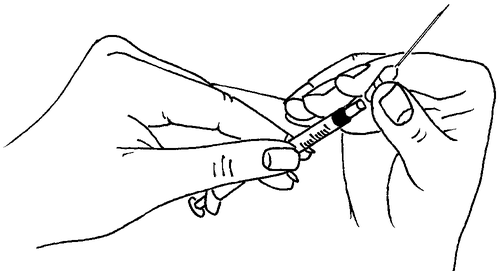
reconstitution.
- Break the top of the solvent ampoule at the point indicated by the dot.
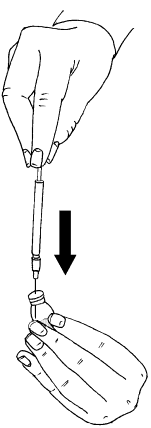
- Insert the needle into the solvent ampoule.
- Draw all the liquid from the ampoule into the syringe.
- Insert the needle through the rubber stopper of the powder vial and slowly
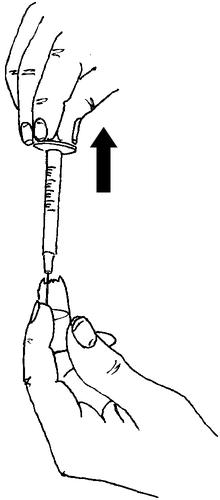
inject all the liquid. Aim for the vial wall to avoid forming air bubbles.
- The powder should dissolve quickly (within 2 minutes), forming a clear solution.
- To facilitate the reconstitution of the powder, the vial can be swirled. Do not
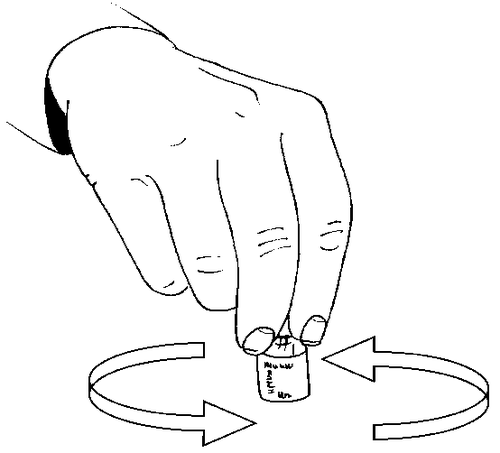
shake, as this may cause air bubbles to form. If the solution is not clear or contains particles, it should not be used.
- Draw the solution back into the syringe.
If the doctor has prescribed more than one vial of MENOPUR per injection, the solution obtained after reconstituting the powder from the first vial can be injected into the second vial of powder. This procedure can be repeated with subsequent vials of powder - up to 3 vials of powder, but only if the doctor has recommended it.
If the doctor has prescribed the medicine BRAVELLE together with MENOPUR, the two medicines can be mixed. To do this, MENOPUR should be reconstituted, the resulting solution should be slowly injected into the vial with BRAVELLE, wait for BRAVELLE to dissolve, draw the solution containing both medicines into the syringe, and inject subcutaneously. This procedure allows avoiding the injection of each medicine separately.
ADMINISTRATION OF MENOPUR:
- After drawing the prescribed dose of the medicine into the syringe, the needle should be changed
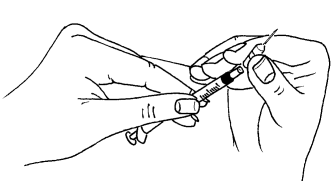
to a short, thin needle (injection needle).
- Hold the syringe with the needle upwards and gently tap the syringe with your finger so that the air bubbles collect at the top. Carefully press the syringe plunger until the first drop of liquid appears at the tip of the needle.
- The patient is informed by the doctor or nurse where to inject the medicine (e.g., front of the thigh, abdomen, etc.).
- Disinfect (disinfect) the skin at the injection site.
- To perform the injection, a skin fold should be created between
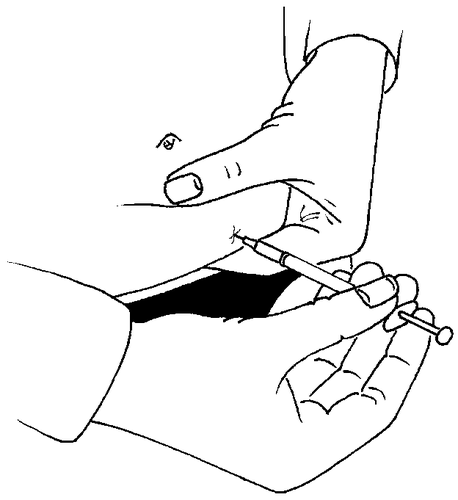
the fingers and the needle should be inserted quickly at a 90-degree angle (perpendicular). Inject the solution by pressing the syringe plunger, and then remove the needle.
- After removing the needle, press the injection site to stop bleeding. Gentle massage at the injection site helps the solution spread under the skin.
- Used items should not be thrown into household waste bins, but disposed of properly.
Using a higher dose of MENOPUR than recommended
In case of using a higher dose of MENOPUR than recommended, the doctor should be informed.
Missing a dose of MENOPUR
A double dose should not be used to make up for a missed dose. In case of missing a dose of MENOPUR, the doctor should be informed.
4. Possible side effects
Like all medicines, MENOPUR can cause side effects, although not everybody gets them.
Hormones used in fertility treatment, such as MENOPUR, can cause excessive ovarian activity, leading to a condition called ovarian hyperstimulation syndrome (OHSS), especially in women with polycystic ovary syndrome. Symptoms include: abdominal pain, abdominal distension, nausea, vomiting, diarrhea, and weight gain. In severe cases of OHSS, rare complications such as fluid accumulation in the abdominal, pelvic, or pleural cavity, breathing difficulties, and decreased urine frequency or amount may occur, as well as the formation of blood clots in blood vessels (thromboembolic disorders) and twisting of the ovaries.
If any of these symptoms occur, the doctor should be contacted immediately, even if they occur several days after the last dose of the medicine.
During treatment, allergic reactions (hypersensitivity) may occur. Symptoms of such reactions may include: rash, itching, throat swelling, and breathing difficulties. If any of these symptoms occur, the doctor should be contacted immediately.
The following side effectsare common, i.e., they occur in 1 to 10 out of every 100 patients treated:
abdominal pain;
headache;
nausea;
abdominal distension;
pelvic pain;
excessive ovarian stimulation causing high activity (ovarian hyperstimulation syndrome);
reactions at the injection site, such as pain, redness, bruising, swelling, and/or itching.
The following side effectsare uncommon, i.e., they occur in 1 to 10 out of every 1000 patients treated:
vomiting;
abdominal disorders;
diarrhea;
fatigue;
dizziness;
fluid-filled blisters in the ovaries (ovarian cysts);
breast disorders, including breast pain, breast tenderness, discomfort, nipple pain, and breast swelling;
hot flashes.
The following side effectsare rare, i.e., they occur in 1 to 10 out of every 10,000 patients treated:
acne;
rash.
In addition to the above, the following side effectshave been observed after MENOPUR was approved, and their frequencyis unknown:
vision disorders;
fever;
malaise;
allergic reactions;
weight gain;
muscle and joint pain (e.g., back pain, neck pain, and pain in the arms and legs);
ovarian torsion, as a complication of increased ovarian activity caused by excessive stimulation;
itching;
hives;
blood clots, as a complication of increased ovarian activity caused by excessive stimulation.
Reporting side effects
If side effects occur, including any not listed in this leaflet, the doctor should be informed. Side effects can be reported directly to the Department of Drug Safety Monitoring of the Office for Registration of Medicinal Products, Medical Devices, and Biocidal Products {current address, phone number, and fax of the Department} e-mail: [email protected] .
Reporting side effects can help gather more information on the safety of the medicine.
5. How to store MENOPUR
The medicine should be stored out of sight and reach of children.
Do not store above 25°C.
Store in the original packaging to protect from light.
Do not use this medicine after the expiry date stated on the carton and labels of the vial and ampoule after EXP. The expiry date refers to the last day of the given month.
Medicines should not be disposed of via wastewater or household waste containers. Ask your pharmacist how to dispose of medicines that are no longer needed. This will help protect the environment.
6. Package contents and other information
What MENOPUR contains
- The active substance of the medicine is highly purified menotropin (Menotropinum) (human menopausal gonadotropin, hMG) in an amount equivalent to 75 IU FSH (follicle-stimulating hormone) and 75 IU LH (luteinizing hormone).
- Other ingredients are:
- powder: lactose monohydrate, polysorbate 20, sodium hydroxide, hydrochloric acid
- solvent: sodium chloride, water for injection, hydrochloric acid 10%.
What MENOPUR looks like and what the package contains
MENOPUR is a powder and solvent for solution for injection.
The carton contains 5 or 10 vials of colorless glass containing the powder.
The carton also contains the same number of ampoules of colorless glass containing the solvent.
Not all pack sizes may be marketed.
Marketing authorization holder and manufacturer:
Ferring GmbH
Wittland 11
D-24109 Kiel
Germany
Date of last revision of the leaflet:
To obtain additional information on the medicine, contact the representative of the marketing authorization holder:
Ferring Pharmaceuticals Poland Sp. z o.o.
Bonifraterska 17, 00-203 Warsaw
Phone: +48 22 246 06 80, Fax: +48 22 246 06 81
- Country of registration
- Active substance
- Prescription requiredYes
- Manufacturer
- ImporterFerring GmbH
- This information is for reference only and does not constitute medical advice. Always consult a licensed doctor before taking any medication. Oladoctor is not responsible for medical decisions based on this content.
- Alternatives to MenopurDosage form: Powder, 600 IU FSH + 600 IU LHActive substance: human menopausal gonadotrophinPrescription requiredDosage form: Powder, 1200 IU FSH + 1200 IU LHActive substance: human menopausal gonadotrophinPrescription requiredDosage form: Powder, 150 IU FSH + 150 IU LHActive substance: human menopausal gonadotrophinManufacturer: Ferring GmbHPrescription required
Alternatives to Menopur in other countries
The best alternatives with the same active ingredient and therapeutic effect.
Alternative to Menopur in Spain
Alternative to Menopur in Ukraine
Online doctors for Menopur
Discuss dosage, side effects, interactions, contraindications, and prescription renewal for Menopur – subject to medical assessment and local rules.






